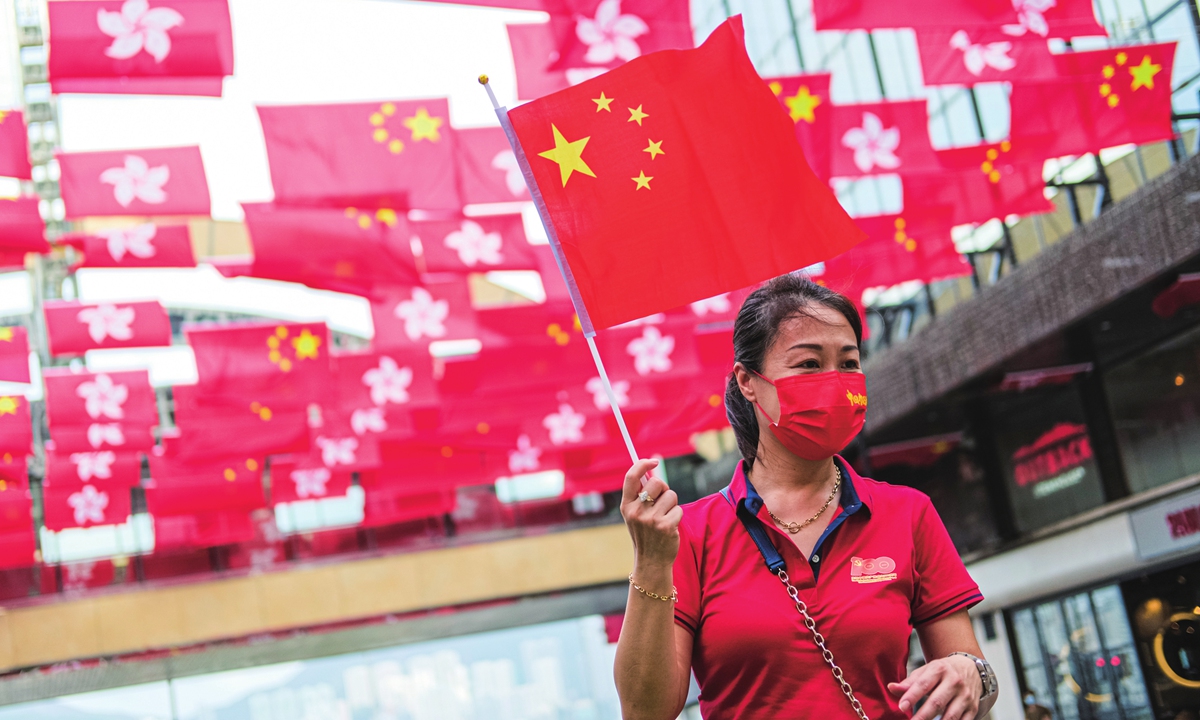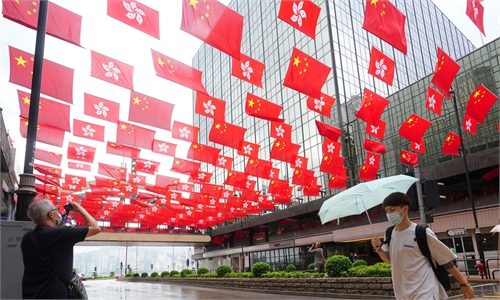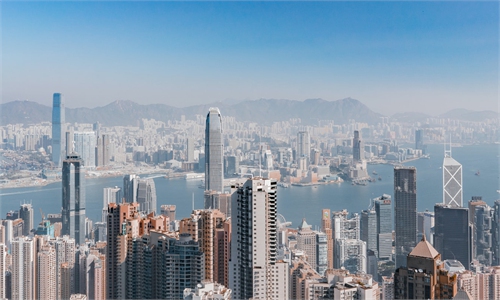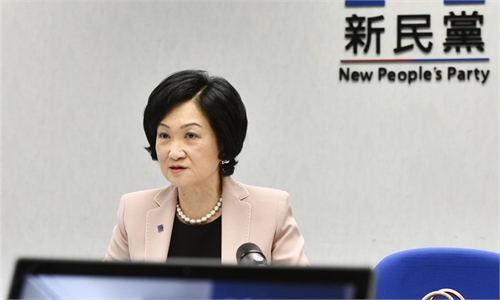
A woman holds a Chinese national flag and stands under the flags of China and Hong Kong SAR on July 1 to celebrate the 100th anniversary of the founding of the Chinese Communist Party and the 24th anniversary of Hong Kong return to China. Photo: IC
Since the national security law for Hong Kong took effect more than a year ago, the city has become peaceful and orderly. By contrast, the US can hardly conceal its restlessness. The US State Department released a so-called commercial warning last year. This week, it issued the Investment Climate Statements. It is clear to all that these tactics are nothing but means to vent the US resentment of the national security law and are bound to be futile.
How is the investment environment in Hong Kong? Investors have their own conclusions based on statistics and facts. Currently, about 1,300 US companies operate in Hong Kong, half of which are regional companies. Among the world's biggest 100 banks, 70 have businesses in Hong Kong. In 2019, the assets and fortune administered in Hong Kong reached a record $3.7 trillion, two-thirds of which came from overseas investors. In 2020, the total market share of the Stock Exchange of Hong Kong rose 24 percent, reaching $6.1 trillion. By the end of 2020, there were 2,538 listed companies. During the first half of 2021, the scale of IPOs in Hong Kong reached $27.4 billion, making Hong Kong remain the world's third largest IPO market.
Hong Kong's position as a global financial center lives up to its reputation. This is recognized by international investors and will not change in accordance with the will of certain US politicians. Even Kurt Tong, former consul general of the US to Hong Kong and Macao who constantly interfered in Hong Kong affairs and holds a prejudiced view of China, admitted in his recent article in Foreign Affairs, "The gravitational pull of large economies is a powerful force - maybe even strong enough to resist the growing antagonism between China and the West."
The so-called commercial warning and investment climate statements made by some US politicians are politically driven. They not only tarnish the reputation of the US government, but also in a certain sense deliberately underestimate the IQ and EQ of international investors. They also arbitrarily hinder market opportunities of US companies.
What should the relationship between politics and economy be? Those US politicians that are stuck in a zero-sum game mindset cannot find the correct answer. They are fixated on resisting the law of development, have overestimated their strength and arrogantly attempted to block the Hong Kong public from embracing a safe country and good families.
The national security law for Hong Kong has injected obvious and sufficient certainty to the business environment in Hong Kong. Of course, this is not in the expectations of some US politicians cheering for Hong Kong violent rioters. To be more precise, they have felt annoyed by this. Because the measures adopted by the US government, be it revoking Hong Kong's special trading status, suspending "preferential treatment to Hong Kong," or imposing so-called sanctions on officials of Chinese central government working in Hong Kong and Hong Kong Special Administrative Region government officials, could not shake Hong Kong's status as an international financial center.
According to Reuters last month, some international banks, funds and different monetary companies such as Citigroup and Goldman Sachs Group said they were stepping up hiring in Hong Kong. Anthony Fasso, CEO for Asia Pacific of US asset manager PineBridge Investments, said, "We consider Hong Kong will stay a globally aggressive worldwide metropolis on the doorsteps of one of many largest and quickest rising economies on earth." His views are quite representative. The feelings of Shan Weijian, chairman and CEP of Hong Kong-based personal fairness group PAG, can also be very indicative: "Everybody within the enterprise group I've spoken to welcomes the peace and stability now, in contrast with the chaos of 2019," Shan noted.
Any act that goes against the mainstream trend will not succeed. This is the reason why no matter how loud the US foghorn is, it cannot drive investors away from Hong Kong. Important factors such as the unique advantages of "one country, two systems," the strong protection offered by the national security law for Hong Kong, as well as the opportunities brought about by the Belt and Road Initiative and the construction of the Guangdong-Hong Kong-Macao Greater Bay Area, all determine that international investors' confidence in Hong Kong is increasing day by day. The trend that Hong Kong will advance and thrive as the international financial center is irreversible.



